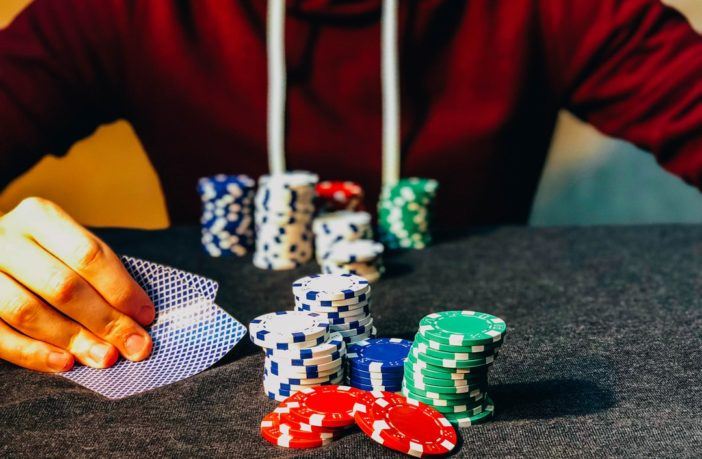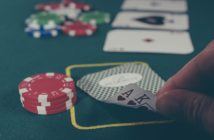Kenny Rogers tells us you need to “know when to fold ’em” and “know when to hold ’em”. Lady Gaga sang about perfecting the “poker face”.
But how do you know when you have a poker hand worth betting on? Or when you should cut your losses and fold? This question plagues gambling newbies and professionals alike.
And while there’s no universal answer, this article will offer some tips and tricks on when to fold your hand when to ante-up.
Your Invitation to the Best Online Pokies in Australia
Like a punt on the slot machines?
Our top rated slots for October 2019 are the smash-hit online pokie sites: Ruby Fortune and Jackpot City Casino.
These sites include some impressive matched bonuses – up to $750 and $1600 respectively! With the potential for some seriously big wins, here’s your chance to get a piece of the action:
Two Types of Poker Players
When it comes to folding your poker hand, there are usually two types of players. Those who fold too often and those who don’t fold enough.
The former loses out on most opportunities to win and makes themselves a target. When you fold too often, other players dub you a rookie. You come off as inexperienced and unsure of yourself.
The latter blindly bets all of their earnings and will quickly end up broke and out of the game. Other players at the table view you as an eager, overzealous fool.
To be successful at the poker table, you need to strike a balance between these two types of players. One of the best poker tactics is to keep your opponents guessing.
Even if you have your own system when it comes to folding or holding, don’t make it obvious to others. The less they know about your technique, the better.
Now let’s take a look at how to create that technique and make it work in your favour.
Know the Game
Before sitting down at the poker table, you should know the rules of the game. There are several types of poker including:
- 3 card
- 7-Card Stud
- Texas Hold ‘Em
- 5-Card Draw
Each game has its own set of rules, but the basic principles are the same. You should know the different types of winning hands and which hands beat others.
There’s nothing worse than going “all in” on a hand you think trumps all, only to learn you’ve been beat at your own game.
The Power of the ‘Check’
If you’re unsure about whether or not to bet, don’t. You can ‘check’ to the next player at the table.
When you check, you’re skipping your turn. The universal sign for checking is tapping the table.
The next player will now bet. At this point, you can either match their bet (call), raise, or fold. Checking is a good technique for buying yourself some time and sizing up your competition.
Players with anything better than a pair will often call the bet or raise. Unless they’re bluffing.
Bluffing involves raising the bet to intimidate other players into folding a good hand even if they themselves have nothing. Some professional poker players have won thousands using bluffing techniques alone.
After a win, players aren’t required to show their cards. This means you’ll never know if the winner had a good poker hand or if you were duped.
Trust Your Instincts
Winning in poker is 50% luck and 50% skill. Knowing when to fold your poker hand has a lot to do with following your instincts. And these instincts will change with every game you play.
There are good and bad days in the world of poker. If you’re on a good streak and every hand you’re dealt is a winner, keep going. Bet a little more and take a few risks.
But if you’re having a bad run and are losing every hand, it may be time to call it quits. Trust your instincts with each hand you’re dealt.
Are you confident your two-pairs will beat the competition? Is the player across the table bluffing?
Winning at poker and knowing when to fold have a lot to do with the other players at the table, which is why sizing them up is crucial.
Pay Attention to Other Players
Have you ever watched professional poker players on television? They wear sunglasses, hats, and hoods to hide their eyes and faces. And no, it’s not about making a fashion statement.
Body language is another important component of poker. Players offer countless nonverbal signs about the hand their dealt. A furrowed brow, eye twitch, or pursed lips may all be signs that they have a great hand or garbage.
Glasses, hats, and other distractions hide these cues. But it doesn’t mean you can’t still get a feel for your opponents.
Over-confident players tend to bet on every hand they’re dealt. They bluff often and thrive on scaring other players into folding. If you have a good hand, don’t let these types of players intimidate you.
Then, there are timid players. The ones that are clearly unsure of themselves. They may shift in their seat, play with their chips or cards, and hesitate before betting.
If you’re working on your own bluffing game, going toe-to-toe with a nervous player is great practice. Trying bluffing with a high pair or two low pairs. But don’t lose your shirt over it. Make reserved bets that if you lose, won’t put you completely out of the game.
Do the Math
You don’t need to be a mathematical genius to know when the odds are for or against you. There are times when it’s okay to take a risk and others when you should fold your poker hand and call it a day.
The best way to decide is by examing your money. Do a quick count of how much money you have. Now, assess the pot and how large the bets are. Can you afford to stay in?
If your money pile is getting low, fold hands that you’re not confident in. Only place bets on hands where you’re more than 50% sure you’ll win. There’s no shame in folding and cashing out your winnings.
Weigh Your Options
Before you fold your poker hand, you need to weigh your options. Folding means you’re automatically out of the game. Everything you put into the pot now belongs to the winner.
Are you prepared to lose everything you’ve bet? If so, fold. But if you feel there’s a chance you might win or you have a fairly decent hand, it’s probably worth the risk to stay in the game.
Plus, if you fold too soon, you’re making it too easy for your opponents to win. Depending on the type of poker you’re playing, wait until at least a few more cards are dealt before throwing in the towel.
This forces other players to (literally) put their money where their mouth is and fight for the win.
Know the Signs of a Good Poker Hand
Seasoned poker players are not only experts at the game of cards, but they’re also well-versed in reading the signs of other players. And you should be too.
When playing Texas Hold ‘Em, each player is dealt two cards to start (hole or pocket cards) and then asked to bet. If a player starts off with a high bet, they likely have a pair, two suited cards, or two high-value cards. Remember this.
Next, the dealer will then lay three community cards face-up on the table (the flop). All players use these three cards along with their two pocket cards to create the best five-card hand.
If the same player who bet big on their first two cards, ups their bet this time, they probably have a decent hand. Two more cards will be dealt face-up (the river and the turn). If at this point you have nothing, you should fold.
Although these signs aren’t a guarantee that your opponents have a winning hand, you should still pay close attention to their betting patterns. It’s unlikely that someone will bet a large amount on their pocket cards unless they’re confident they’ll win.
Bluffing in Texas Hold ‘Em comes into play following the flop, so pay close attention to the bets made before and after.
Tips from the Experts
Who better to teach you about when to fold your poker hand and when to bet it all than the experts? Here are a few, basic tips when it comes to folding and holding in poker.
- Never play poker drunk (your judgment is skewed and you may inadvertently bet your home or first born child)
- Don’t play every single hand (remember, it’s okay to fold)
- Never count your poker chips at the table
- Avoid high-limit games (unless you’re a professional)
- Don’t stay in the hand just because you’ve already bet (staying in out of fear of losing what you’ve already bet could result in losing even more)
With a little time and experience, you’ll find your own poker style and tips that work for you.
Time to Get in the Game
Whether you like poker or slot machines, you have to be in it to win it. And knowing when to fold your poker hand helps you stay in the game longer and keep your shirt.
Looking for new, fun ways to gamble? Learn more about sports betting here or try your hand at BINGO! But whatever game you choose, remember to play smart and have fun.







